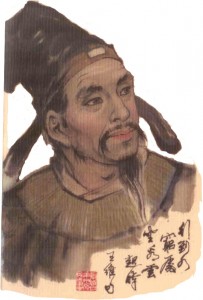 In 8th Century China, Wang Wei was one of the most renowned poets and artists of the age and around 400 of his works survive to this day. He was born into aristocracy in 699 in Jinzhong and spent much of his life as a government official, as well as rising to the high status of a poet.
In 8th Century China, Wang Wei was one of the most renowned poets and artists of the age and around 400 of his works survive to this day. He was born into aristocracy in 699 in Jinzhong and spent much of his life as a government official, as well as rising to the high status of a poet.
Wang Wei was a precocious and very talented child. At 19 he moved to the capital to undertake exams to enter into civil service and, while he was doing this, his ability as a poet came to the knowledge of the royal court. After passing the exams, his first job was to act as a musician but, following a mistake in etiquette, he was moved to looking after the court granary.
His bad luck changed rather quickly when he got to know poets Zhang Jiuling and Meng Haoran and he eventually ended up as an assistant censor. In 731 he went to the Chinese frontier where there were many military conflicts and stayed for about 8 years.
Wang Wei was well known for his shanshui, or mountains and rivers, poetry that was influenced by landscape painting. The poems were specifically written to be presented with a particular art work and, along with Meng Haoran, Wang Wei was one of the movement’s chief practitioners. He was a masterful exponent of the jueju form of poetry that paired couplets together, each line made up five or seven syllables.

Notable amongst his works is the Wang River Collection that he wrote in collaboration with his friend, 15 years his junior, Pei Di. These verses are characterized by the simple way they are written and the underlying deeper meaning and more complex messages that can be gleaned on looking at them more closely.
After his time spent on the Chinese frontier, Wang Wei returned to Liangzhou where he explored the local countryside and also first made the acquaintance of Pei Di. With his government salary and the money he was making from works of art, he was able to purchase a large estate. Information about his life at this time is obscured by the start of the An Shi disorders that prevented further careful record keeping of events.
The An Shi rebellion had a large effect on China’s culture and it’s known that Wang Wei was captured and taken to the capital. The rebels tried to force him to collaborate with them but he feigned both deafness and tried to ruin his voice by drinking a foul concoction of medicine. When the rebellion was finally defeated, Wang Wei’s troubles weren’t over as the government tried to have him prosecuted as a traitor.

The charges were finally dropped and Wang Wei returned to working in a government position. Although the rebellion continued to cause problems across the country, he was able to live out the rest of his life in relative comfort. He died somewhere between 759 and 781 and would have been around 60 years of age. He was buried on his estate.

